Assassin’s Creed Valhalla Review
Valhalla is an action-packed Viking RPG, but it falls short on stealth
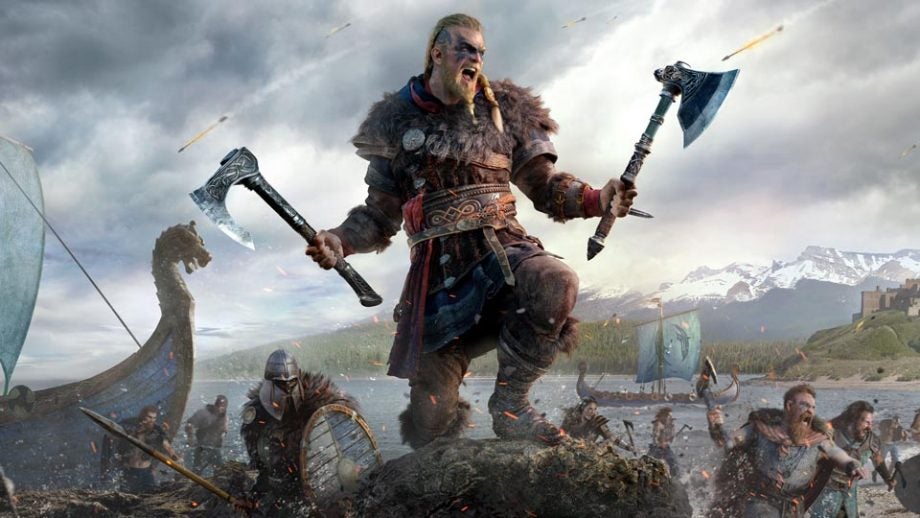

Verdict
Assassins Creed Valhalla is a hugely enjoyable entry to the series, offering an enthralling Viking RPG experience with super-satisfying combat and exploration of medieval England. However, as a consequence the series has drifted away from its stealth roots, giving the Creed series an identity crisis.
Pros
- Engaging Viking-style combat
- Story scratches Game of Thrones itch
- Excellent RPG level progression
- Medieval England is gorgeous and a joy to explore
Cons
- Lots of game-crashing issues
- Small focus on stealth
Key Specifications
- Review Price: £49.99
- Developer: Ubisoft Montreal
- Platforms: PS4, PS5, Xbox One, Xbox Series X, PC, Stadia
- Release Date: November 10, 2020
With the Assassin’s Creed series taking a road trip through all of history’s most notorious chapters, it’s no surprise to see Ubisoft finally putting us in the boots of a Viking with its latest entry.
Epic-scale castle conquests, bone-crunching axe combat and enough drinking competitions to floor a university student all help to make you feel like every inch the Norwegian warrior that’s slapped across the promotional art of this new adventure.
While Ubisoft delivers on its promise of an action-packed Viking adventure, it has also consequently seen the Assassin’s Creed series stumble into an identity crisis and drift the furthest yet from its stealth-centred roots. Such a move is hardly out of the blue, with Origins and Odyssey both showing signs of a transition to the open-world RPG genre, but Valhalla feels like the end result of this journey.
That’s not to say Valhalla ditches stealth altogether. You’ll occasionally get a mission to sneakily scout out a castle, steal supplies and sabotage ballista, but it’s hardly the main focus and that’s for good reason – you’re playing as a hulking big Viking who simply feels out of character leaping from rooftop to rooftop like an agile assassin.
Related: Astro’s Playroom Review
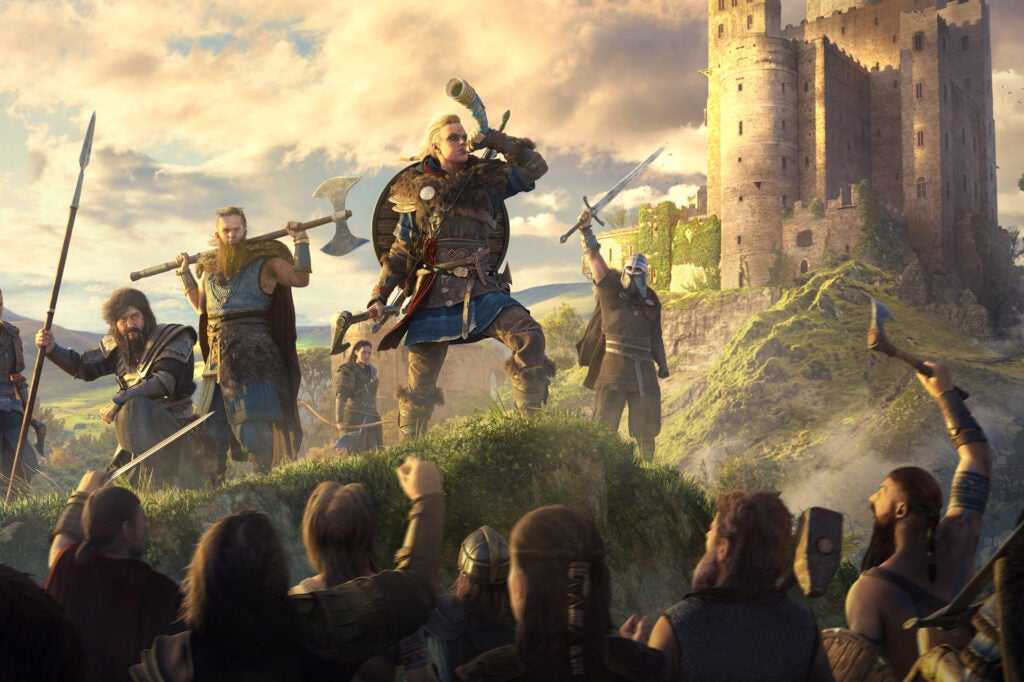
And aside from London (or Lundun as it’s called in Valhalla), the majority of early Medieval England is rather flat, making it a poor playground for vertical-minded assassins when compared to the towering Italian cities of the original Creed games. If you love the Assassin’s Creed series primarily for its stealthy takedowns, you’ll find little joy with Valhalla.
Fortunately, the hand-to-hand combat is so satisfying that I didn’t really miss the stealth-focused missions. You’re able to choose a range of weapons, from swords and spears to the classic Viking axe. Each weapon features a slew of their own bloody finishing animations, giving you a taste for the brutal warfare Vikings are renowned for.
A new stamina bar largely influences your style of play, limiting movement temporarily if completely drained which proved to be the cause of my death on numerous occasions. Dodging attacks and inaccurate axe swings will quickly deplete your stamina, preventing the likes of button mashing from being a viable option.
I initially found this feature frustrating, preventing me from using the quick-footed battle tactic that has served me so well in previous action games. But as things progressed, I learned to use my shield for blocking and parrying more, resulting in some cinematic Viking-style fighting with Eivor staggering enemies and smashing through wooden shields with his blood-stained axe.
Related: Miles Morales Review
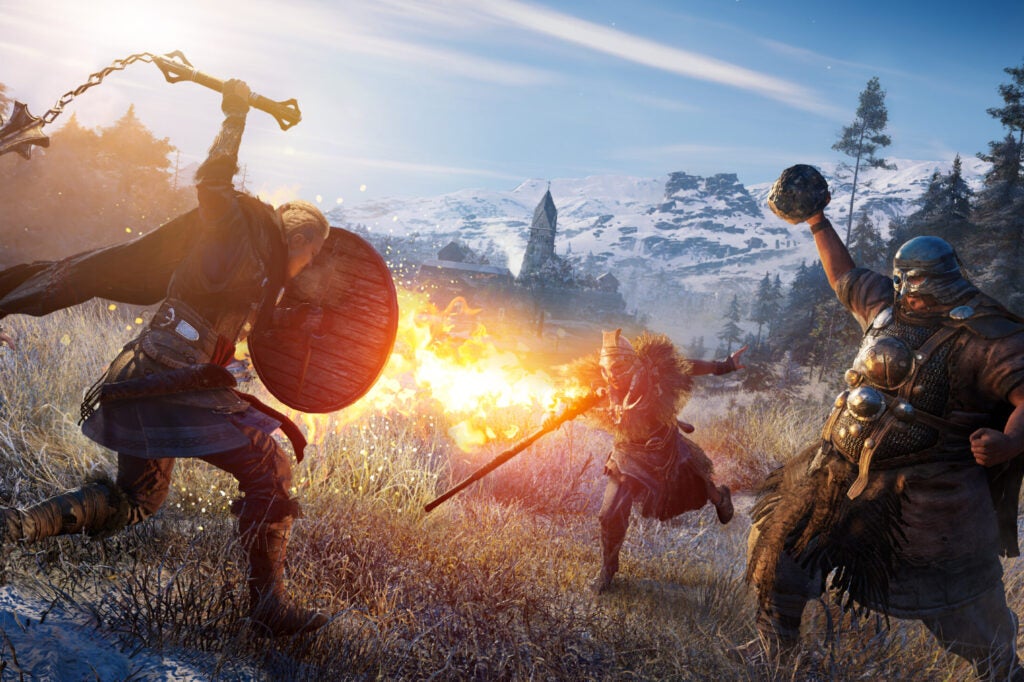
The bow and arrow has also been given a larger focus in Valhalla, as it not only proves handy for headshotting unsuspecting guards, but can also be used to target enemy weak points during melee combat. Hit every weak point and the enemy will enter a ‘staggered state’ allowing you to trigger a finishing move that often downs your foe in one violent blow. I loved using the bow against large enemies that were dangerous up close, although the lack of a default option to craft arrows meant maintaining a healthy supply of them was a tedious process.
While unlockable special abilities (such as hurling axes and firing poison arrows) help to vary up the combat throughout the incredibly long campaign, it still remains arguably simplistic. Combat soon became too easy and monotonous in the early few hours of the game, as soldiers swiftly fell to my axe, even in the epic scale raids and assaults that see you fighting against an entire Anglo Saxon army.
However, Valhalla steadily introduces new hardened classes, such as nimble spearmen and goliath soldiers that look like Hodor with a weaponised ball and chain. Such elite troops all require different tactics to keep you on your toes; spears are hard to dodge but easy to deflect, while your shield might as well be made out of paper when used against certain heavy weapons. These new classes ensured combat remained challenging and engaging right to the bloody end.
I wasn’t a personal fan of the health system though. Ubisoft has ditched the health regeneration from Odyssey, with food now required to replenish your health bar. This is hardly a new mechanic for RPG games, but Valhalla limits the number of health rations you can store in your inventory, resulting in multiple frustrating moments that aren’t seen with the likes of Skyrim and Witcher.
Related: DualSense Review
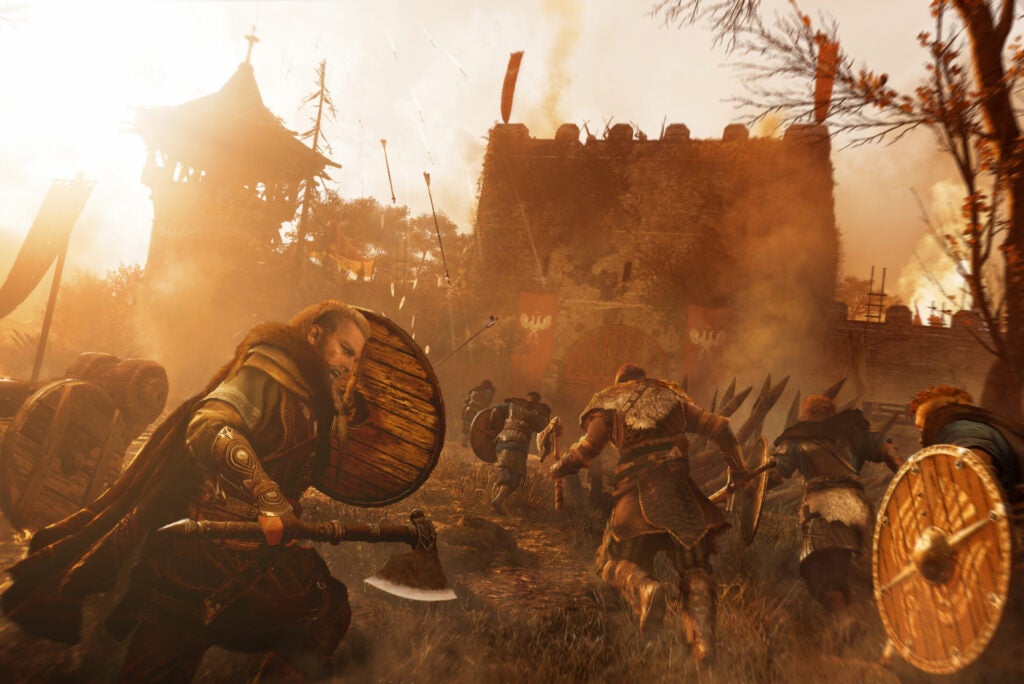
The number of health rations you can store can be increased by investing leather and iron ore, but since these are the same resources required to upgrade your armour, weapons and arrow space, there’s a good chance you’ll neglect this area. As a result, I’ve often entered boss battles with no health backup at all, and while you could arguably blame me for being underprepared, it feels odd to be searching an assaulted castle for mushrooms during the heat of battle.
On the plus side, Valhalla has addressed a number of Odyssey’s jarring RPG mechanics, most noticeably the level gatekeeping. Previous modern Creed games saw a specific combat level attached to every single NPC, deterring you from engaging with any foe who is a good few levels higher than your own. I despised this feature, as it often forced you to grind between story missions and continuously chop and change weapons and gear to ensure you’re strong enough.
Fortunately, Valhalla does away with all that, with the enemy’s strength seemingly scaling with your own progression. Each region of England still has its own recommended level, so it’s ill advised to go charging into one of the endgame locations from the very beginning, but I never once felt the need to grind through side quests before being able to start playing the next chapter in the main story.
There’s also a larger focus on upgrading your gear and weapons instead of replacing them after every mission. This meant I spent less time doing inventory management, and more time decapitating heads from shoulders. Don’t worry, there’s still plenty of reasons to scout out collectibles, as you can attach runes to gear for new perks while new abilities can be discovered through ancient texts that are hidden throughout all of England, providing lots of incentive for exploration of England’s rolling hills.
Valhalla represents Ubisoft’s best take on the RPG genre yet, especially with the new settlement management system, which has been built upon from Assassin’s Creed 3. Since you’re the second in command of a Viking clan that has just arrived on English shores, it’s your job to collect resources for new buildings.
Related: Xbox Series X Review
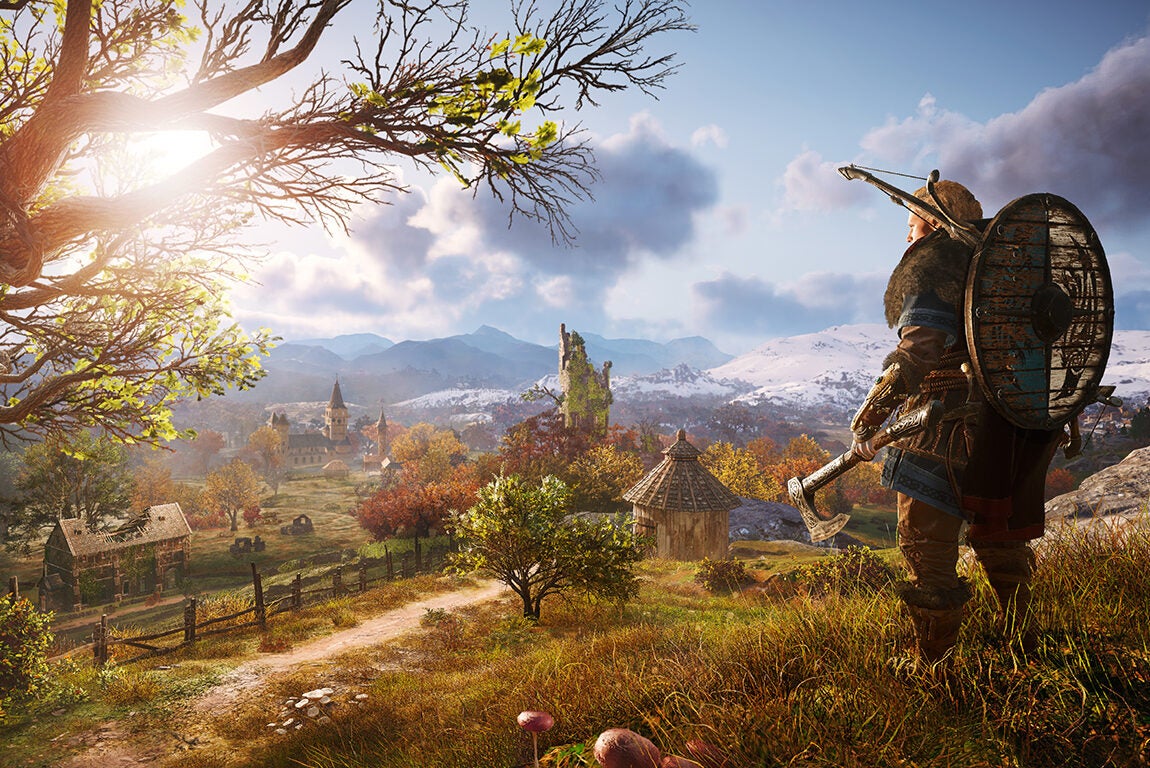
There’s plenty of incentive outside of the story to do so too, as building the likes of a trading post will allow you to buy useful items, while a shipyard will open up the option to customise your warship. It’s also very satisfying to see a lifeless camp gradually progress into a bustling community thanks to your hard work.
However, you’ll need to raid English towns for supplies in order to build up your own settlement, which involves slaughtering seemingly innocent guards, robbing the poor and burning homes to ash. It’s difficult not to feel like the bad guy in such scenarios, but that’s the life of a Viking after all. Eivor seems to be one of the most empathetic Vikings of his clan, but he often looks in the other direction when one of his allies does something abhorrently despicable, which seems to be often.
The uncomfortable moral quandaries aside, Valhalla features an excellent story, with several entertaining self-contained plots with enough back-stabbings, blockbuster battles and devilish schemes to fill up a Game of Thrones novel. As a member of a budding new settlement, it’s down to you to secure alliances with other leaders throughout England, which means sucking up to lords or helping power-hungry characters to usurp existing kings.
While Eivor isn’t the most memorable character, often acting as a blank slate so you can influence his decisions and dialogue choices, the supporting cast of characters is among the very best I’ve seen in the series, as Valhalla explores the stories of both the inhabitants of war-fatigued England and the raiding Danes that caused fractions throughout the four kingdoms.
It’s the relationship between Eivor and his Jarl, Sigurd, that provides the most entertaining dynamic though. While the latter is the leader of the Raven clan, his new obsession with the Hidden Ones organisation sees him neglect his duties. Eivor happily steps into the leadership void, but sees him accused of trying to usurp his adopted brother as a result. Such tensions escalate throughout the story of Valhalla, keeping me glued to the screen throughout the plus 30-hour main story.
Related: Xbox Series S Review
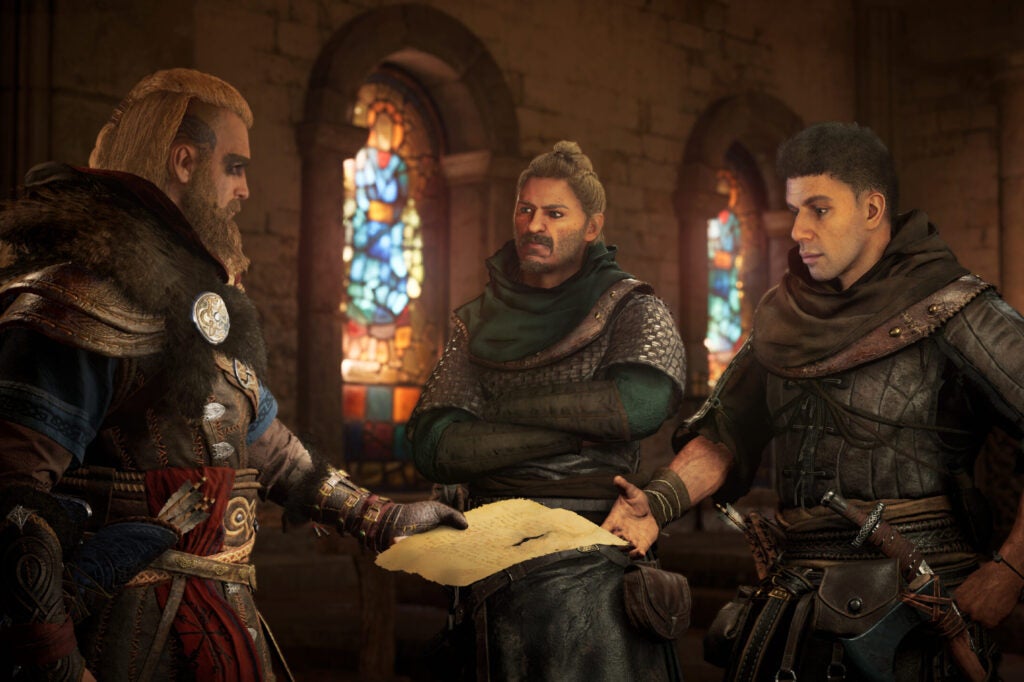
The weakest element of Valhalla’s narrative is undeniably everything that surrounds the sinister Ancient Ones organisations and the absurd animus subplot, two of the biggest narrative tropes that stitch all of the Assassin’s Creed entries together. Valhalla would benefit from detaching itself from the Creed series altogether, as Ubisoft’s attempt to fit Valhalla into the same universe as the likes of Origins and Odyssey feels like a hindrance to this viking RPG.
There’s no doubt that Ubisoft has done a terrific job of bringing medieval England to life however. While England lacks the exotic wildlife of Egypt and the grandiose cities of Greece, its many farmlands, swamps and settlements are packed full of content to keep me entertained no matter which edge of the map I wandered to.
I’ve encountered the aftermath of satanic rituals and stumbled across a great number of NPCs pleading for help, from a woman who wants her pooch rescued from a burning house to a man unaware of a great big axe lodged in his skull. Such side quests feel organic rather than having a checklist of tasks on my Quest page. This not only made me more willing to engage with the side quests, but also helped to make England feel alive.
The graphical fidelity makes England look absolutely stunning too. Seemingly set during Autumn, trees are coated in brightly coloured leaves which makes views of the rolling hills a jaw-dropping sight. I played through Valhalla on the Xbox Series S with a 1440p resolution. I can’t wait to see this game running in 4K, as it’s bound to be among the best looking games released this year.
Related: Halo Infinite
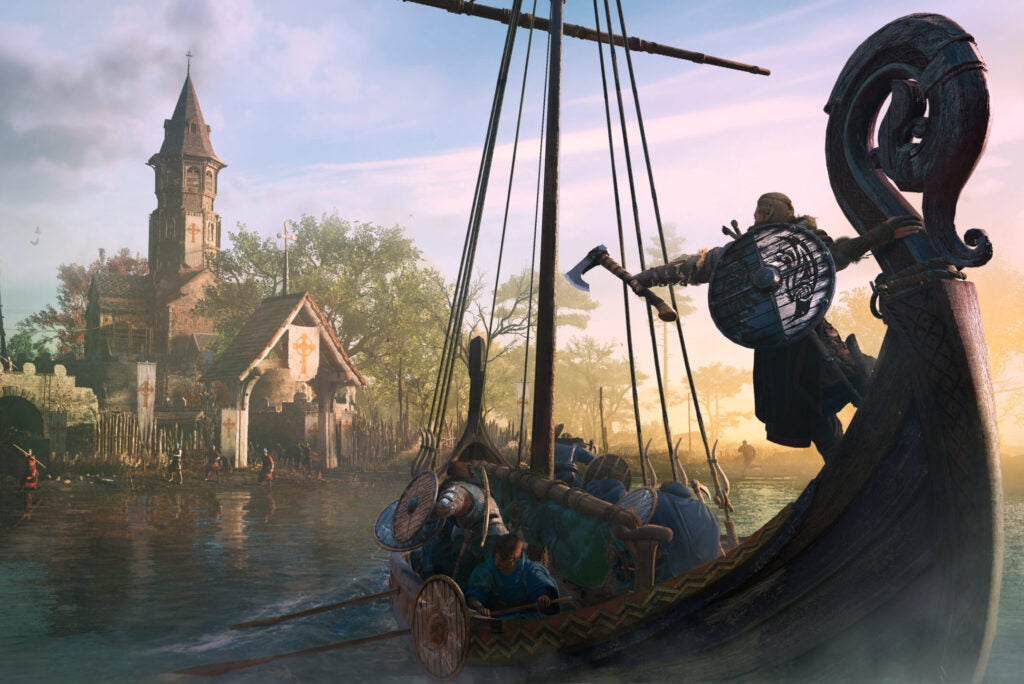
However, Valhalla is also plagued by a number of technical issues that marred my experience. It crashed on multiple occasions, during cutscenes, in combat and even mid-way through a manual save. To make matters worse, the auto-save feature isn’t very reliable, as I’ve seen comfortably over two hours of game time erased due to technical hiccups.
I’ve also seen issues with the AI which can see enemy soldiers standing still during a castle invasion. I can understand that Ubisoft doesn’t want to overwhelm the player with so many enemies launching attacks simultaneously, but it doesn’t half ruin the immersion.
Verdict
Assassin’s Creed Valhalla is an excellent RPG adventure, with the hand-to-hand combat among the best in Ubisoft’s franchise. Stealth has unfortunately taken a backseat, which feels very strange for a Creed game, but the epic-scale battles and sophisticated RPG mechanics more than make up for such shortcomings.
The highlight here are the multiple Game of Thrones-esque stories that take place in Medieval England, which scratch that itch for devilish schemes and shocking, bloody twists.
Sadly, a few glaring flaws and a number of technical hiccups can see Valhalla become very frustrating at times. If you’re happy to put up with such nonsense though, you’ll be rewarded with one of the best open-world games of the year, with comfortably enough content to see you spending dozens of hours across war-torn England.


